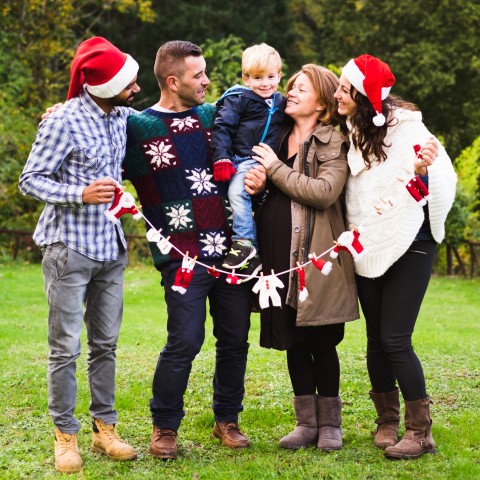Imagine that you’re traveling to good old Germany, and you want the real experience (not just staying in a hotel or hostel like everyone else). Well, this is fair enough, and we definitely encourage going for the full Germany experience. But first, you’ll need to know some basic family terms, like how to say “father” in German.
Why is it so important to know the words for family members in German? Imagine the following situation:
—
You arrive at your freshly booked Airbnb, and your host welcomes you with a nice dinner. But there’s one hitch: you find yourself eating with his parents, some friends, his cousin, and his grandmother, too. Your host starts to introduce everyone, pointing to each person as he states their name:
Ich möchte dich meinen Eltern vorstellen. Das sind mein Papa und meine Mutter. Und dort sitzt meine Großmutter und mein Cousin.
Despite your host’s best efforts to familiarize you with his family, you actually find yourself more confused about who’s who. Oh no!
—
While learning things like family member terms in German first-hand is always a great idea, you may be more comfortable studying up on this before your trip. After all, when it comes to family in German, words like the one in our example are going to come up all the time, so you should prepare using German lessons about family like this one!
GermanPod101 has prepared a guide just for you, covering vocabulary terms for any family member you may find yourself introduced to! Going through this guide, you can work on your language skills beforehand, so that you can make the most of your first-hand learning experiences in Germany. So let’s get started!
Table of Contents
- Family in German – Die Familie
- List of Closest Family Members + Basic Sentence Patterns
- More Family and Endearment Terms
- How to Talk about Family
- Cultural Insights in a German Family
- How GermanPod101 Can Help You Learn about Family in German
1. Family in German – Die Familie
Familie is the German word for “family.” As you can see, the word is more similar to English than you thought. Might this be because German families aren’t so different from those in the U.S. or other countries? Let’s take a look.
When you look over the demographics of Germany, you can clearly see that we are a dying nation. This means that every year, more people die than are being born, and our average age is getting older and older from year to year. (This is, of course, not exclusive to Germany, and is also happening in other first-world countries.)
I want to give you a short example of the above statistics using my family history. My grandmother was one of six children in her family at the end of the Second World War, and this was considered a normal-sized family. Now, my mom and dad are both one of three children. And today, there’s just me and my sister. From each of my uncles and aunties, I have between zero and three cousins.
Do you see what I mean? German families have become much smaller over the last seventy-eighty years. Today, people tend to think first about their lives and careers, and secondly about kids and family.
Families are the most important reference point for a child until the end of his or her time in college. But for many people, the end of college also represents a diminishing significance for their parents’ home. Keep in mind that I don’t want to say German kids don’t love their parents. Of course they do.
The family is, and will always be, important in Germany, so learn about it and adapt to it!
2. List of Closest Family Members + Basic Sentence Patterns
1- General Terms for German Immediate Family
We created an overview of the most important family in German vocabulary words, such as your siblings, parents, and grandparents. The German is on the left, and the English equivalent is on the right.
| die Eltern | “the parents” |
| der Vater | “the father” |
| die Mutter | “the mother” |
| das Kind die Kinder |
“the child” “the children” |
| die Geschwister | “the siblings” |
| die Schwester die Halbschwester |
“the sister” “the half-sister” |
| der Bruder der Halbbruder |
“the brother” “the half-brother” |
| der Sohn | “the son” |
| die Tochter | “the daughter” |
| die Ehefrau | “the wife” |
| der Ehemann | “the husband” |
| der Großvater der Opa |
“the grandfather” “the grandpa” |
| die Großmutter die Oma |
“the grandmother” “the grandma” |
To help you out with some basic words and the pronunciation for family member terms, we created a free lesson in our free-of-charge course. With enough practice, you’ll be able to talk about your parents and siblings in German like it’s nothing!
2- Talking about Family Members
There are usually three situations when talking about family:
- You’re trying to talk about your family
- You’re talking about someone else’s family members
- You’re asking someone about their family
That means you need to describe who’s family you’re talking or inquiring about. This is done with possessives.
Similar to “my,” “yours,” “his” in English, in Germany we use meine, deine, and seine. To prepare you for the upcoming challenges associated with each of the situations outlined above, we’ve provided you with some basic questions and answers.
| Wer ist deine Mutter? “Who is your mother?” |
Das ist meine Mutter. “This is my mother.” |
| Sind deine Eltern verheiratet? “Are your parents married?” |
Nein, meine Eltern sind geschieden. “No, my parents are divorced.” |
| Wie viele Geschwister hast du? “How many siblings do you have?” |
Ich habe zwei Geschwister, zusammen sind wir 3 Kinder. “I have two siblings, together we are three kids.” |
| Hast du einen Bruder oder eine Schwester? “Do you have a brother or a sister?” |
Ja, ich habe zwei Brüder und eine Schwester. “Yes, I have two brothers and one sister.” |
| Wie ist der Name deines Bruders? “What is the name of your brother?” |
Mein Bruder heißt Peter. “My brother’s name is Peter.” |
| Wie alt sind deine Großeltern? “How old are your grandparents?” |
Meine Oma ist 65 und mein Opa ist 70 Jahre alt. “My grandma is sixty-five and my grandpa is seventy years old.” |
| Ist sie deine Ehefrau? “Is she your wife?” |
Ja, das ist meine Ehefrau Eva. “Yes, this is my wife Eva.” |
Take a close look at how we used the possessive pronouns. They always have to be adapted to the person you’re talking about.
3. More Family and Endearment Terms
1- German Extended Family
Everybody has family members outside of their immediate family. Below, we give you some family member terms that you’ll face every day while living with a German family. We won’t go into too much detail, as the half-sister of your siblings’ aunt isn’t really interesting anymore.
| der Onkel | “the uncle” |
| die Tante | “the aunt” |
| der Cousin [kuˈzɛŋ] | “the cousin” (m) |
| die Cousine | “the cousin” (f) |
| der Neffe | “the nephew” |
| die Nichte | “the niece” |
This doesn’t seem too hard to understand, does it? With all of the terms we’ve gone over so far, you’re almost ready to talk about your family in various contexts. There are some more things we’ll cover in the next chapters, but what we have so far are the closest family members.
2- Endearment Terms
Families are cute, and you can always hear little grandsons or granddaughters calling their grandparents “granny” or “grandpa.” Those are just a couple examples of so-called endearment terms, and of course we have them in Germany as well.
We’ll show you two quick ways to create endearment terms, and give you some examples. Before we go on, we want to let you know that this doesn’t work with all family members the same way.
1. Adding an i
The first way to create endearment terms in Germany is to cut the last letter(s) of the term, and replace it with the letter i. It’s no mistake that we mentioned it can be the last letter or letters. When the term ends with a vowel, you replace only the last letter. In any other case, you need to replace the last two letters.
Here are some examples:
Mama -> Mami
“mother” -> “mom/mommy”
Mutter -> Mutti
“mother” -> “mom”
Papa -> Papi
“father” -> “daddy”
Vater -> Vati
“father” -> “dad”
Opa -> Opi
“grandmother” -> “granny”
Oma -> Omi
“grandfather” -> “grandpa”
But there are also examples where it doesn’t work, such as:
Onkel -> Onki
Tante -> Tanti
Großmutter -> Großmutti (theoretically this works, but you’re never going to use this)
2. Adding chen to the end of the word
This might be the better-known form for any German learner. This one is a bit trickier and has some special rules. The basic rule is that you just add chen after each term. But be aware that when doing this, in some cases, if the word ends with a vowel, you have to cut this vowel before adding the chen. Or, if the word has a vowel in-between, you change it to ü, ö, or ä (instead of u, o, a).
Good examples are:
Großmutter -> Großmütterchen (grandmother -> grandma)
Onkel -> Onkelchen
Tante -> Tantchen (aunt -> auntie)
Cousine -> Cousinchen
As you can see, sometimes there’s not even a proper English translation for the endearment term you can create in German. The good thing about this way of creating endearment terms is that you can use it with almost everything, and you’re not limited to people or family members. Take a look at these examples:
Bierchen from the word Bier (beer)
Tischchen from the word Tisch (table)
Tässchen from the word Tasse (cup)
4. How to Talk about Family
It’s quite easy to introduce your family to another person in German. Let’s imagine ourselves sitting around a large table, where all the family is eating together, and a friend of yours arrives for the first time. You both stand in front of the table.
| Das ist meine Mutter und das mein Papa. | “This is my mother and this is my dad.” |
| Dort drüben sitzen meine Großeltern. | “Over there are sitting my grandparents.” |
| Neben ihnen siehst du den Bruder meiner Mama, meinen Onkel. | “Next to them, you can see the brother of my mother, my uncle.” |
| Mein Cousin, der Sohn meiner Tante ist heute nicht hier. | “My cousin, the son of my aunt, he is not here today.” |
| Meine Oma ist leider schon gestorben. | “My granny unfortunately has already passed away.” |
5. Cultural Insights in a German Family
The family is, for most Germans, one of the fundamental aspects of their lives. The family is an important part of every German. Children usually grow up close to their grandparents (who sometimes take care of their grandchildren when the parents are at work). Further, trust is a big thing for German families. But even with this strong bond, Germans are moving out of their parents’ home quite early to study, work, and become financially independent.
We’ve already mentioned that most German families are fairly small compared to those in other countries. Family size strongly depends on where you live, though. For instance, in the countryside, it’s normal for multiple generations to live on a big farm together, or even more than one family from one generation.
So it can be possible to find houses with up to ten people in the more rural areas, but even there, everybody has their own space and flat. You can live there with your parents, your grandparents, and maybe even your uncle’s family.
In the city, the situation is typically different, and families don’t live together. Everybody has their own flat or house, and don’t see each other in daily life.
Traditionally, the man is the head of the family. But let’s face it: this isn’t really how it works anymore. Women enjoy the same rights as men, and all decisions are made as a couple, or even among the entire family including children.
In the old days, it was common for people to get married after living together for a while. Now, you can find couples that stay together their whole lives and never get married. But trends are now coming back to the traditional way.
For some more information about German culture, we’ve prepared another lesson for you.
6. How GermanPod101 Can Help You Learn about Family in German
We hope that you got some helpful insight from our article about families in Germany, such as how to talk about family members. You now know a little bit about the typical family situation in Germany today, and how people are organizing their daily lives.
You should be able to talk about your immediate and extended family, introduce them to others, and talk to someone about them.
If you want to really boost your German skills, then we recommend our private teacher program which focuses on your personal goals based on your current level.
But we won’t leave you without making a quick gift to you. We have free-of-charge courses on GermanPod101.com for learners of every level:
Save yourself a spot today!


















